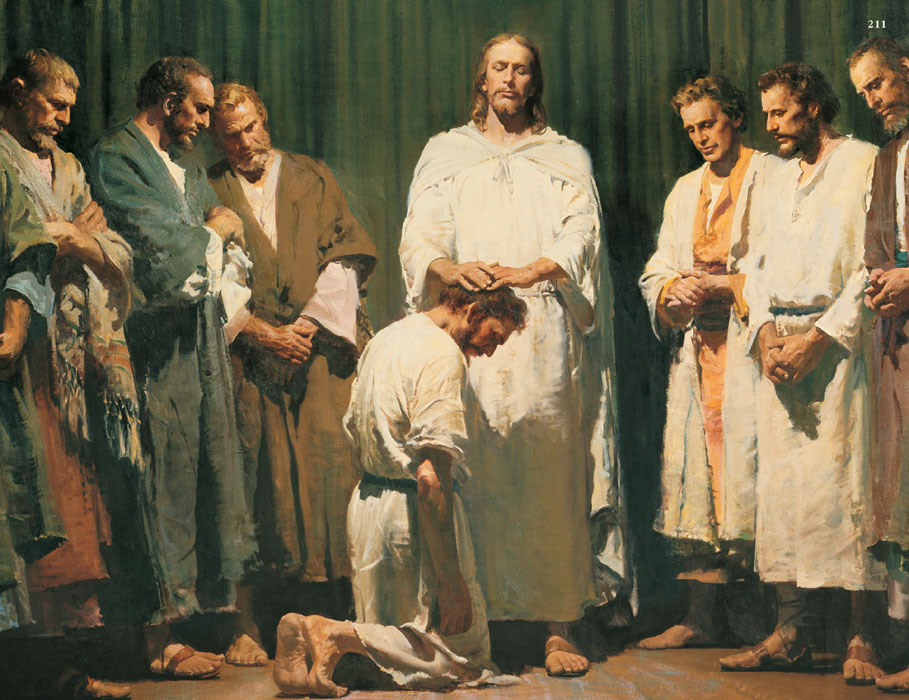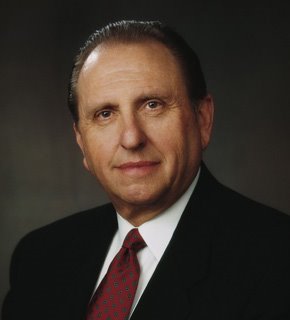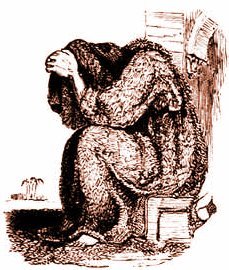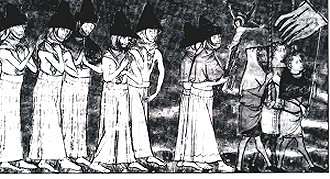 Q. What kind of a God would go through all the trouble of Salvation, teach his apostles so many things, and wait until 1820 to give Joseph Smith authority? That, my friends, does not make sense. I am really worried about you guys and I will truly pray for you. You know nothing of Church history or the teachings of Christ who by the way wanted his apostles to spread his good news. Why would he then wait for Joseph Smith?
Q. What kind of a God would go through all the trouble of Salvation, teach his apostles so many things, and wait until 1820 to give Joseph Smith authority? That, my friends, does not make sense. I am really worried about you guys and I will truly pray for you. You know nothing of Church history or the teachings of Christ who by the way wanted his apostles to spread his good news. Why would he then wait for Joseph Smith?
I am glad that you asked this question. It is apparent that there has been misunderstanding of what we believe. God didn’t wait to give his authority to Joseph Smith. The original 12 apostles had the authority, but it was not passed on after their deaths. We believe that God restored his authority through Joseph Smith.
In answering this question, I first need to define apostasy. According to Webster’s Revised Unabridged Dictionary, apostasy is “An abandonment of what one has voluntarily professed; a total desertion or departure from one’s faith, principles, or party.” Evidence that there was apostasy happening at the time of the apostles (Acts 20:29-31, 1 Cor. 11:18, Galatians 1:6-7, 2 Tim. 1:15, 2 Tim. 2:16-18, 1 John 2:18-19) and that the pure Gospel of Jesus Christ would be lost over time (2 Thess. 2:1-3, 1 Tim. 4:1, 2 Tim 4:3-4, Amos 8:11-12) is evident from study of the New and Old Testaments.
The priesthood, or the God-given authority to act in His name, is a crucial part of the foundation upon which the Church of Jesus Christ must be built. For instance, In Matthew 16:18-19 we discover that Christ gave unto Peter the “keys of the kingdom of heaven.” In other verses of the New Testament we read that conferral of authority to another was marked by the laying on of hands of him who held the authority to do so (1 Tim. 4:14, 2 Tim. 1:6, Heb. 6:2). Furthermore, in Hebrews we read “No man taketh this honor unto himself, but he that is called of God, as was Aaron” (Heb. 5:4). It is clear that there are several things that the early Church had: God-given authority to act in God’s name, this authority gave those men who held it the right to administer the ordinances of the church and it was passed from the prophet/apostles to other men by the laying on of hands.

After Christ’s death the apostles did what they were commissioned to do: spread the Gospel to all of the earth. However, as a consequence of martyrdom and geographical separation, the priesthood keys were not passed on. The early bishops of the church did not have the apostolic authority that Peter, James and John did, or else they would have been called apostles. For example, Linus the first bishop of Rome (often assumed to be the head of the church after Peter’s death), according to Eusebius of Caesarea, was a bishop (i.e. a local congregation’s minister), not an apostle (Church History, Book III, Chapter II). Eusebius, while he calls these early bishops successors of the apostles, he speaks of these bishops as men who were called to lead that particular group of people under the direction and guidance of the apostles (Church History, Book III, Chapter IV). Now, I am not saying that Linus or any of the other bishops were bad men, but what I am trying to say is that with the apostles and the keys of the kingdom gone, there was no clear direction from God on how to run the Church. I am sure they did the best that they could, but eventually there began to be major disagreements in the church. This is evident by the Council of Nicaea, which met in part to discuss the Arian controversy. The disagreement was centered on the relationship between the Father and the Son. This issue would have been resolved very quickly had there been a prophet who could receive divine revelation and held the authority to determine church doctrine. As it was, Constantine, the Emperor with no ecclesiastical authority took the lead in the council and made them come to a decision.
Take the example of Peter making doctrinal decisions from Acts chapter 11; it is clear that Peter held the keys to decide such matters. He received a revelation that the Gospel was to go to the Gentiles as well as the Jews. Those present at the meeting accepted Peter’s statement, because they recognized that he held the authority to institute practices and doctrine for the entire Church. The process was simple, and it was not a matter of politics. This pattern was repeated in Acts 15. Had there been a prophet on the earth in the fourth century, there would have been no need for the Council of Nicaea. How could something so fundamental as the character of God and his Son come into question by the leaders of Christ’s church? This alone is evidence enough that the leaders of the church at that time did not have the authority to receive revelation from God for the church, nor did they have the authority to act in his name.
Christ didn’t waste his time, nor did the apostles. Rather, there was an apostasy. This pattern has been repeated numerous times through history. We see it with Adam, Abraham, Noah, Moses and so on. God calls a prophet to teach the people and gives him authority. Some people accept what the prophet has taught, but eventually the people turn from the truth. No one had the authority to speak in God’s name nor did they have the authority to administer the ordinances necessary for salvation after the original twelve apostles were killed. True, there were many men who tried to reform what they thought was the truth, but these men were not called of God as the ancient prophets were.
In addition to the above evidences of apostasy, Peter taught that at some future time there will be a restoration or ‘restitution of all things’ (Acts 3:21). In order for a restoration to occur, there had to be a loss. Thus, according to the scriptures and prophets, there would be an apostasy and then there would be a restoration of not only the truth, but of all things (Ephesians 1:10).
In 1820, God the Father and Jesus Christ appeared to Joseph Smith and called him to the work. He was given the priesthood authority—that is, he was given the keys of the kingdom. Through Joseph Smith, Christ’s church has once again been established on earth. The keys of the kingdom that Joseph Smith held have been passed in an unbroken chain down to the current prophet, seer, revelator and president of the church.  His name is Thomas S. Monson; we have a quorum of twelve apostles who spread the Gospel of Jesus Christ all over the world. They are called of God and set apart by the laying on of hands by those who have the authority to pass the priesthood on.
His name is Thomas S. Monson; we have a quorum of twelve apostles who spread the Gospel of Jesus Christ all over the world. They are called of God and set apart by the laying on of hands by those who have the authority to pass the priesthood on.
We have a massive missionary force, almost 53,000-strong, who are in nearly every country in the world. They all proclaim that God has once again spoken to his people through a prophet and that the Gospel of Jesus Christ, which was lost through apostasy, is once again upon the earth. We proclaim that Jesus lives and that he is the Savior of all mankind and that all can partake of salvation through faith in the Lord Jesus Christ, repentance, baptism by immersion for the remission of sins and receiving the gift of the Holy Ghost by the laying on of hands (by someone holding priesthood authority).
I hope this answers your question and clears up your confusion. Think about what I have written. God knows if it’s true. Ask Him about it in prayer. I invite you to contact the missionaries who are in your area by going to this website and entering your information. A pair of young men or young women will come to your door to teach you further about what we believe. Thanks for your inquiry.
 Several months ago, my toddler son found a lot of joy in ripping the internet cable out of the wall. Not just the cable, mind you, but the entire faceplate with the cable still attached. I started having him sit on my lap with his arms forcibly folded right after he did it. He totally hated it, so I knew it was working. After a half-dozen “time outs” (that lasted like 5 seconds each), he stopped pulling the cable out of the wall.
Several months ago, my toddler son found a lot of joy in ripping the internet cable out of the wall. Not just the cable, mind you, but the entire faceplate with the cable still attached. I started having him sit on my lap with his arms forcibly folded right after he did it. He totally hated it, so I knew it was working. After a half-dozen “time outs” (that lasted like 5 seconds each), he stopped pulling the cable out of the wall.



